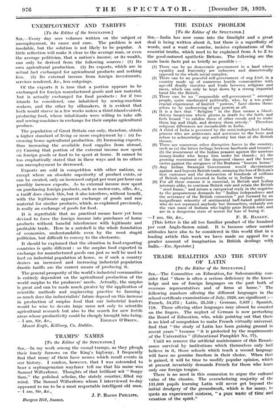UNEMPLOYMENT AND TARIFFS
[To the Editor of the SPECTATOR.] SIR,—Every day sees volumes written on the subject of unemployment, its cause and cure. The problem is not insoluble, but the solution is not likely to be popular. A little reflection will make it clear to the average man, or even the average politician, that a nation's income, or its wealth, can only be derived from the following sources : (1) Its own agricultural production. (2) Its exports, which are in actual fact exchanged for agricultural products and nothing less. (3) Its external income from foreign investments, services rendered, &c., less outgoings.
Of the exports it is true that a portion appears to be exchanged for foreign manufactured goods and raw material, but is actually exchanged for food products : for if two islands be considered, one inhabited by sewing-machine makers, and the other by silkmakers, it is evident that both would starve in a few weeks unless a third island existed, producing food, whose inhabitants were willing to take silk and sewing-machines in exchange for their surplus agricultural produce.
The population of Great Britain can only, therefore, obtain a higher standard of living or more employment by : (a) In- creasing home agricultural production. (b) Increasing exports, thus increasing the available food supplies from abroad.
(c) Causing that portion of the external income now spent on foreign goods or food to be spent at home. It cannot be too emphatically stated that in these ways and in no others can unemployment be decreased.
Exports are sold in competition with other nations, so except where an absolute superiority of product exists, or can be created, only an increased output per man per hour can possibly increase exports. As to external income now spent on purchasing foreign products, such as motor-cars, silks, &c., a tariff does check this, but it also interferes, without benefit, with the legitimate apparent exchange of goods and raw material for similar products, which, as explained previously, is really an exchange of goods for food.
It is regrettable that no practical means have yet been devised to force the foreign income into purchases of home products without baneful interference with legitimate and profitable trade. Here in a nutshell is the whole foundation of economics, understandable even by the most stupid politician, but difficult to convey to the electorate.
It should be explained that the situation in food-exporting countries is quite different : as the surplus food exported in exchange for manufactured goods can just as well be used to feed an industrial population at home, so if such a country desires an increased and increasing industrial population drastic tariffs are the correct means of producing it.
The general prosperity of the world's industrial communities is entirely dependent on the agricultural production of the world surplus to the producers' needs. Actually, the surplus is great and can be made much greater by the application of scientific methods and engineering practice to farming : so much does the industrialists' future depend on this increase in production of surplus food that our industrial leaders would be wise to devote large sums not only to scientific agricultural research but also to the search for new fertile areas whose productivity could be cheaply brought into being.
































 Previous page
Previous page